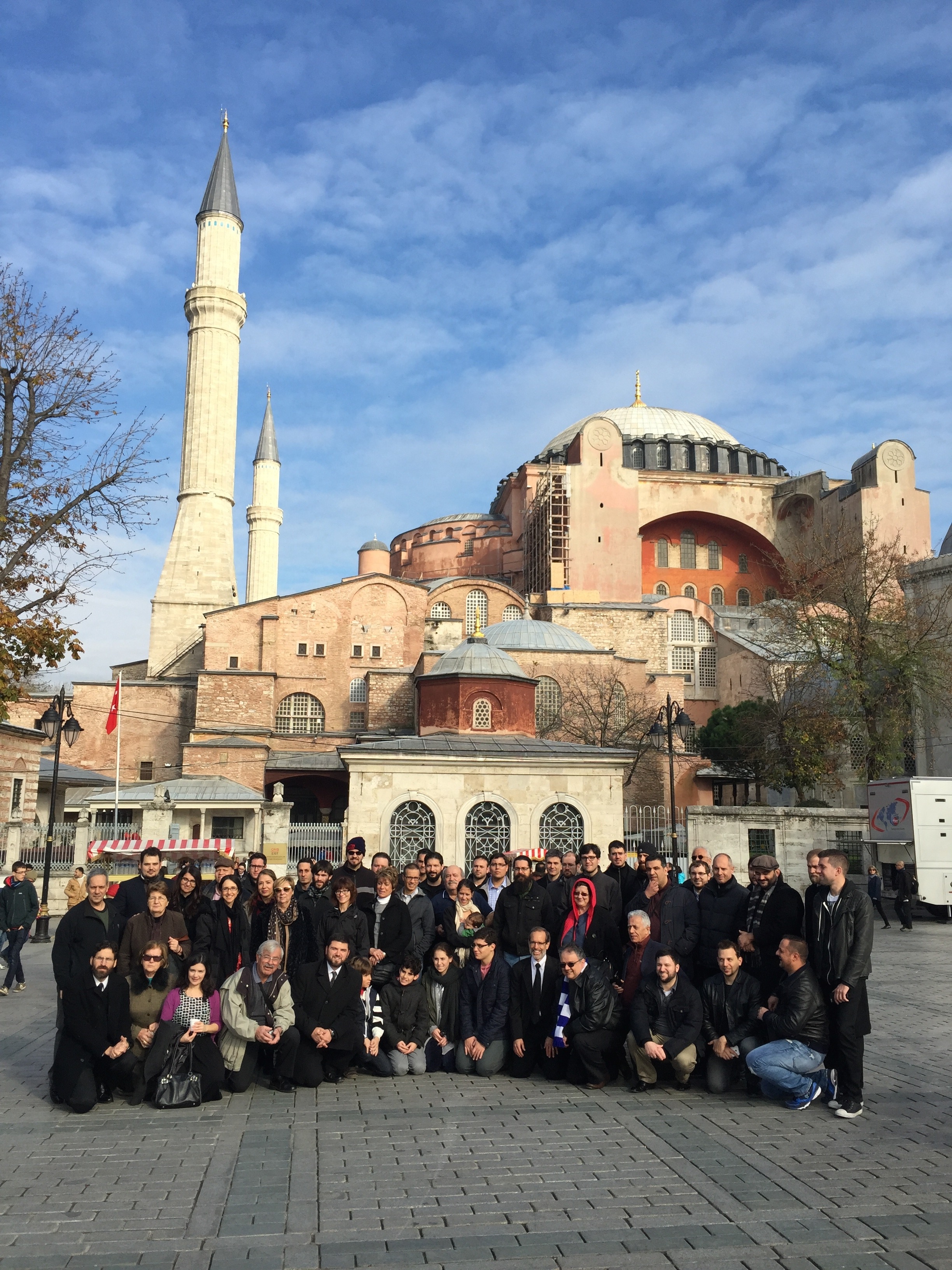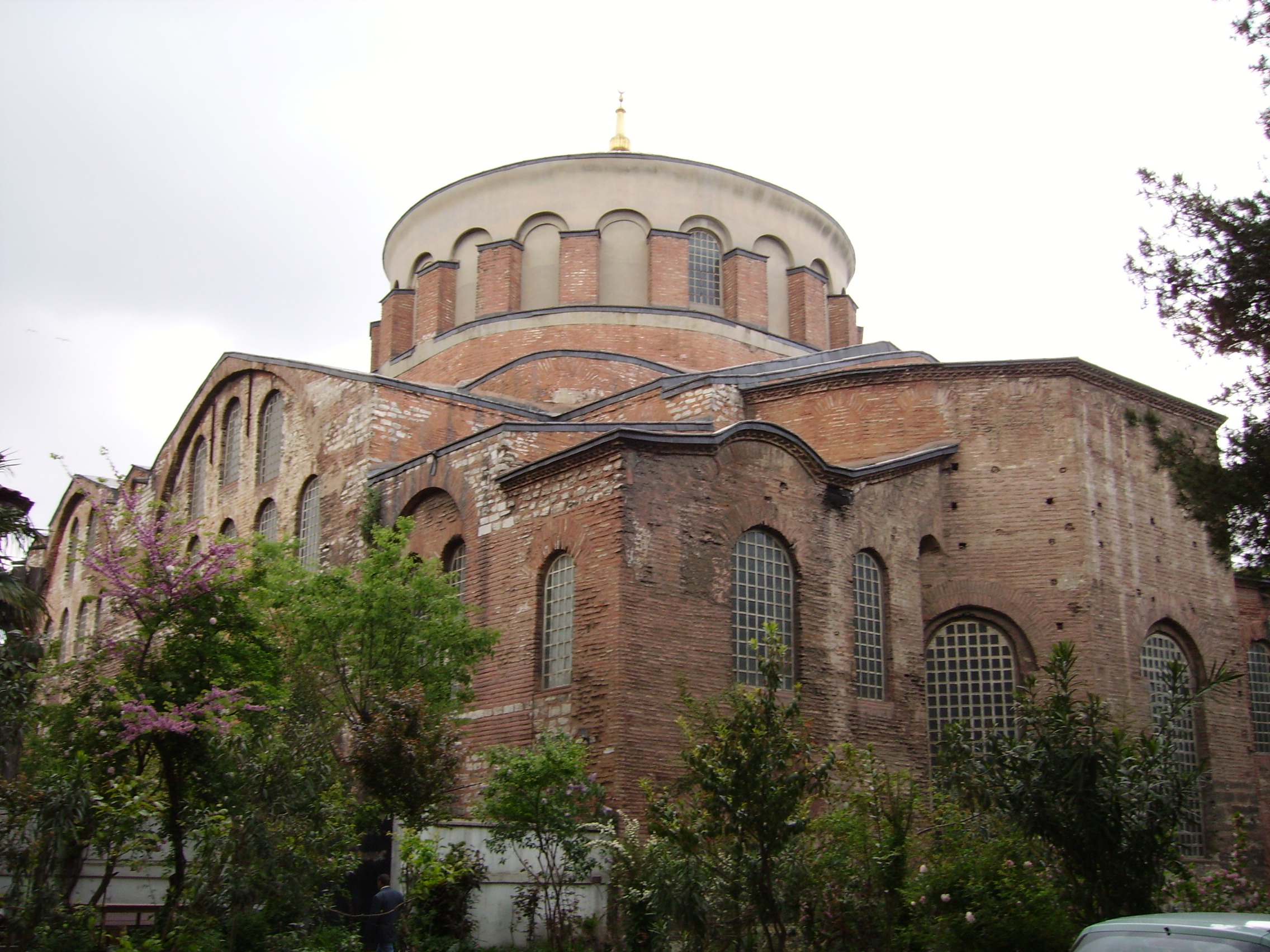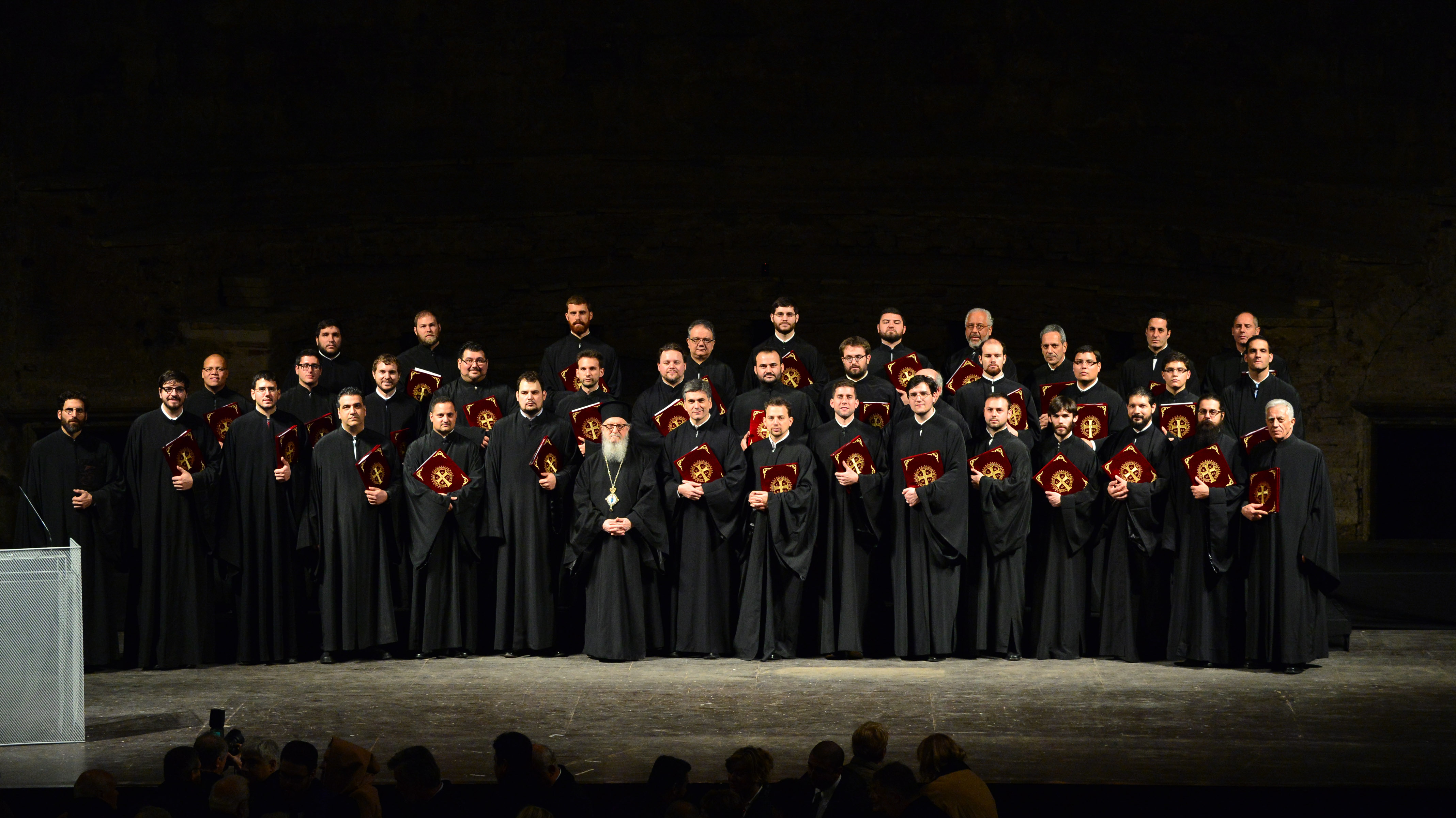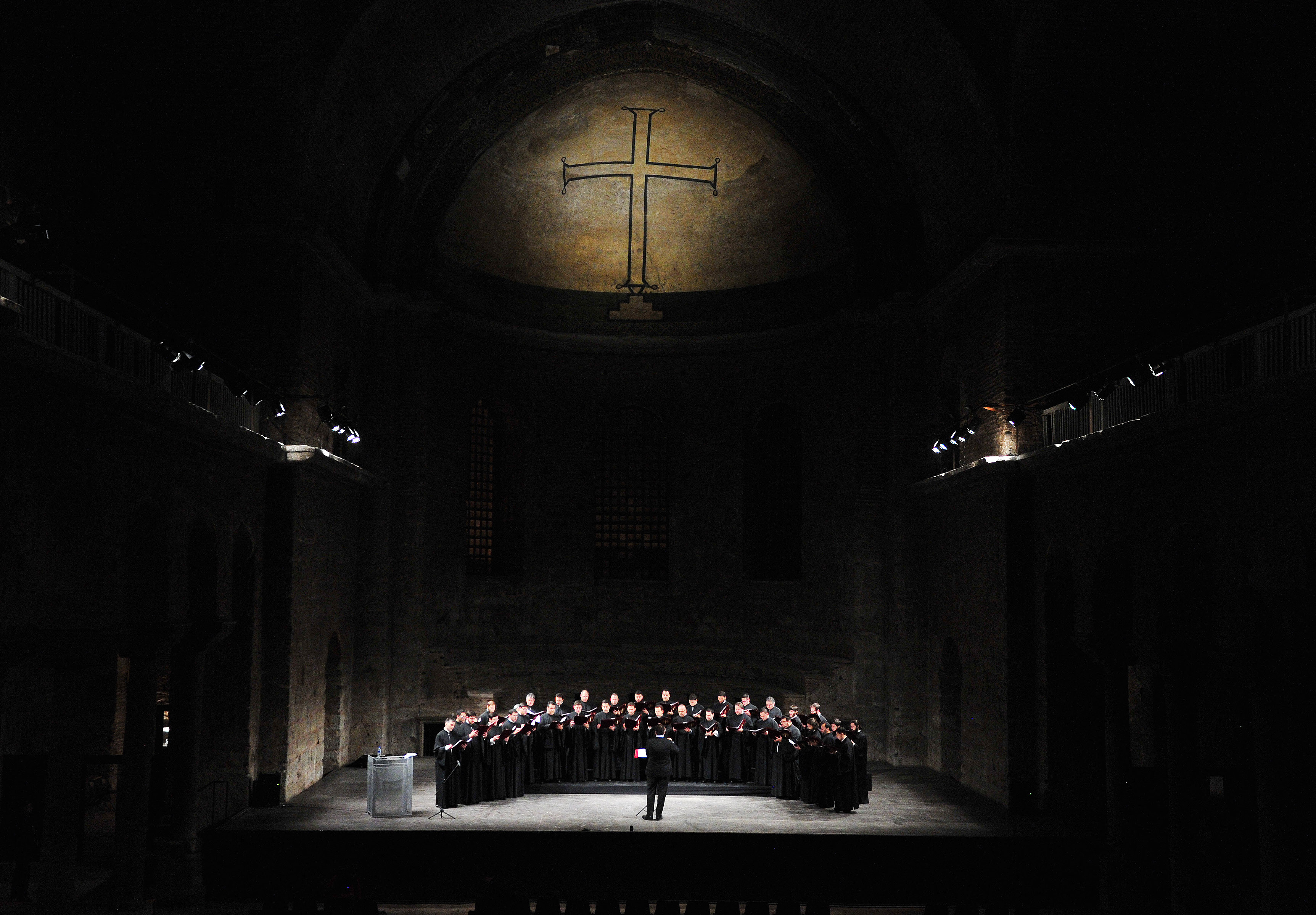ARCHDIOCESAN BYZANTINE CHOIR RETURNS HOME FROM HISTORIC SECOND
PILGRIMAGE TO THE ECUMENICAL PATRIARCHATE AND
CONCERT IN THE ANCIENT CHURCH OF HAGIA IRINI
NEW YORK, NY— With the blessing of His Eminence Archbishop Demetrios of America, thirty-seven members of the Archdiocesan Byzantine Choir of the Greek Orthodox Archdiocese of America traveled to Constantinople (November 27 – December 1) for the Thronal Feast of the Ecumenical Patriarchate and Feast of St. Andrew the Apostle. This occasion was significant because it also marked the first visit of His Holiness Pope Francis of Rome to the Ecumenical Patriarchate.
After experiencing delays—weather in the United States, computers issues in Turkey— the choir arrived safely in Constantinople the morning of Thanksgiving Day. Weary but eager to take in the sacred sites, the group started by visiting the historic Monastery of the Life-Giving Spring in Balukli to receive holy water and to visit the tombs of the Patriarchs who are buried there; among them is former Archbishop of America and later Ecumenical Patriarch, Athenagoras. From there, the group visited the famous Monastery Church of Chora and took in its architecture and well-known mosaic and fresco iconography. Next, the group visited the Church of Panagia Vlachernon, where the hymn Ti Ypermaho was first chanted. The choir chanted this hymn, and Dr. Grammenos Karanos, Assistant Professor of Byzantine Liturgical Music at Holy Cross Greek Orthodox School of Theology, gave an explanation on the origins of both Ti Ypermaho and the Akathist hymn to which it was originally added. Undaunted, the group continued to the churches of St. Nicholas and St. Haralambos where it met with Fr. Nikolaos of Dionysiou Monastery of Mt. Athos, who is a renowned iconographer and conservator, and expert in Byzantine monuments throughout the Great City. He educated the group on the status of some of the Orthodox Christian communities remaining in Constantinople. Finally, the group reached the hotel, where later that evening all 61 members of the choir’s delegation shared a Thanksgiving Day meal in honor of His Eminence Archbishop Demetrios of America.
 On Friday morning, the choir visited the great edifice erected by the Emperor Justinian, Hagia Sophia (the Church of the Holy Wisdom of God). After a thorough and sobering tour of this great monument and relic of our Church’s living history, the group walked a short distance to the underground cisterns that date to the same era. After a light lunch and a walking tour of the remains of the Hippodrome, the choir made an out-of-the-way stop to a small rug shop in the neighborhood. It was here that the group not only learned about the art of rug-making, but was introduced, three levels below the street, to an ancient agiasma (Holy Spring) that had been discovered when the business owners were doing basement renovations. In this unassuming location survives a faint fresco icon of the Virgin Mary above still-running water. Opposite this spring is the entrance of an ancient church which has yet to be excavated. Fr. Nikolaos of Dionysiou dated the icon to the fourth century, making it perhaps one of the oldest surviving icons in the city. The final activity of this day was to visit the “small Hagia Sophia” church, which currently operates as a mosque, but dates to the sixth century, and was a prototype of the larger Hagia Sophia.
On Friday morning, the choir visited the great edifice erected by the Emperor Justinian, Hagia Sophia (the Church of the Holy Wisdom of God). After a thorough and sobering tour of this great monument and relic of our Church’s living history, the group walked a short distance to the underground cisterns that date to the same era. After a light lunch and a walking tour of the remains of the Hippodrome, the choir made an out-of-the-way stop to a small rug shop in the neighborhood. It was here that the group not only learned about the art of rug-making, but was introduced, three levels below the street, to an ancient agiasma (Holy Spring) that had been discovered when the business owners were doing basement renovations. In this unassuming location survives a faint fresco icon of the Virgin Mary above still-running water. Opposite this spring is the entrance of an ancient church which has yet to be excavated. Fr. Nikolaos of Dionysiou dated the icon to the fourth century, making it perhaps one of the oldest surviving icons in the city. The final activity of this day was to visit the “small Hagia Sophia” church, which currently operates as a mosque, but dates to the sixth century, and was a prototype of the larger Hagia Sophia.
On Saturday November 29th, members of the group visited several sites throughout the city, including the Church of Saint Paraskevi opposite the Patriarchate across the Golden Horn where the tomb of the Neo-martyr Saint Argyro is located as well as the famous Holy Trinity church in Taksim, and the Topkapi Palace. That evening, the group made its way to the Ecumenical Patriarchate for Festal Vespers for St. Andrew the First-called Apostle. Immediately following, the group witnessed the arrival of His Holiness Pope Francis of Rome side-by-side with His All-Holiness Patriarch Bartholomew I of Constantinople and New Rome. The two processed into the nave of the church side-by-side, after having lit candles in the narthex, to the choirs’ chanting of Axion Estin. A Doxology service was chanted, Pope Francis and Ecumenical Patriarch Bartholomew exchanged addresses, and then greeted each other with a kiss of peace, and more than this, Pope Francis asked for the Patriarch to bless him, kissed the Patriarch’s hand, and Patriarch Bartholomew kissed the top of Pope Francis’ head as he did so. Following this historic occasion, the group returned to the hotel for a dinner held in honor of Patriarch Bartholomew hosted by the Archons of the Ecumenical Patriarchate.
The morning of Sunday, November 30th saw the group back at the Patriarchal Church of St. George for Orthros—over which Metropolitan Methodios of Boston presided—and Divine Liturgy presided over by His All-Holiness Ecumenical Patriarch Bartholomew, and concelebrated by other hierarchs of the Holy and Sacred Synod. Pope Francis was in attendance and was seated opposite the Patriarchal throne, with several Latin clerics in attendance with him. Once the faithful had received Holy Communion and the closing prayers of the Divine Liturgy were completed, His All-Holiness once again addressed Pope Francis, in Greek, from the Patriarchal throne, and Pope Francis responded from his seat in Italian. At the completion of their mutual addresses, they descended from their places to meet in the middle of the nave and to embrace one another.
 With only a short time to rest, the choir made its way to the historic Hagia Irini church, which is located adjacent to Hagia Sophia. The church, one of the few not to be converted to a mosque by the Ottomans and later Turkish state, now functions as a concert hall. Though its current condition leaves much to be desired, its solid, ancient walls rejoiced as holy Orthodox hymns shook them once more—if only for an hour.
With only a short time to rest, the choir made its way to the historic Hagia Irini church, which is located adjacent to Hagia Sophia. The church, one of the few not to be converted to a mosque by the Ottomans and later Turkish state, now functions as a concert hall. Though its current condition leaves much to be desired, its solid, ancient walls rejoiced as holy Orthodox hymns shook them once more—if only for an hour.
With more than 400 people in attendance, the Archdiocesan Byzantine Choir, under the direction of Dr. Demetrios Kehagias, ascended the steps to the altar-turned-stage, chanting the beloved hymn, Ti Ypermaho. The program included musical selections that were first heard within the Great Imperial City of Constantinople beginning with pieces composed by Petros the Peloponnesian, Lampadarios of the Great Church of Christ and arguably greatest post-Byzantine ecclesiastical composer.
Commenting on the historical significance of the concert, Archdeacon Panteleimon Papadopoulos, managing director of the Archdiocesan Byzantine Choir, said, “without exaggeration, this second concert in Hagia Irini constitutes a tremendous blessing from God especially as it seals the historic meeting between Pope Francis and Ecumenical Patriarch Bartholomew, a meeting of peace and reconciliation. To be in the church of Hagia Irini, a church that was never converted into a mosque, and to chant hymns from our ecclesiastical tradition in praise of our Lord and in honor of His All-Holiness Ecumenical Patriarch Bartholomew whom we not only love, but know very well the conditions and pressures of his patriarchal ministry, is profoundly humbling. I know that I speak for all the people who joined our choir on this trip when I say that we all felt a great amount of gratitude to God for bestowing upon us this great blessing to perform, or should I say pray in Hagia Irini. The choir members have expressed to me that, ‘this is city and its holy treasures are inexhaustible. No one can understand who they are, and what being an Orthodox Christian means unless they visit the Patriarchate and the Great Churches of Constantinople.’”
After the concert, the choir, along with the Archons of the Ecumenical Patriarchate, joined His Eminence Archbishop Demetrios of America for a farewell dinner in the Mega Revma neighborhood on the Bosphoros.
On Monday, December 1, the group boarded its return flight to the United States and arrived home safely.
The members of the choir that performed were: Dr. Demetrios Kehagias, Director, Rev. Fr. Aristidis Garinis, Rev. Fr. Demetrios Kazakis, Archd. Panteleimon Papadopoulos, Rev. Dn. Eleftherios Constantine, Professor Grammenos Karanos, Nektarios Antoniou, Yorgi Argarun, John Boyer, Luis Camacho, Gabriel Cremeens, George Giavris, Aaron Gilbert, Nicholas Gregoriades, Andreas Houpos, Antonios Kehagias, Athanasios Koukoulis, Nicholas Mavromoustakos, Michael Mercado, Athanasios Minetos, Anastasios Mirisis, Michael Odegaard, Dimosthenis Papaioannou, Fotis Papiris, Nicholas Paros, George Petrides, George Psevdos, Peter Romanovsky, Nicholas Roumas, Neofitos Sarigiannis, John Spanos, Christos Stavropoulos, Christos Stroubakos, Apostolos Theodoropoulos, Charleton Trumppower, James Tsimis, Chris Vitelas, Haralambos Zaharis.
Article by : Andreas Houpos, Member of the Archdiocesan Byzantine Choir
To see photos click here:
https://www.flickr.com/photos/goabyzantinemusic/sets/72157649299011459/
For the Remarks of the His-Holiness Ecumenical Patriarch Bartholomew Click Here.
Click here to view the Video of Concert.
Read more...

